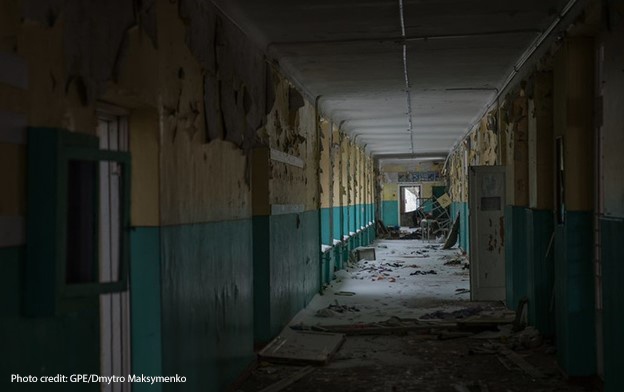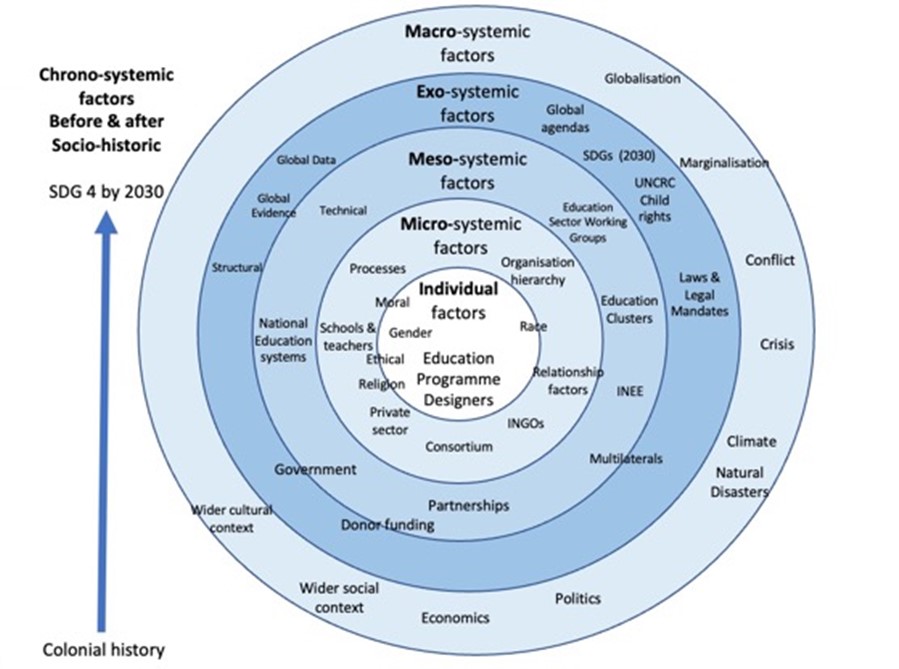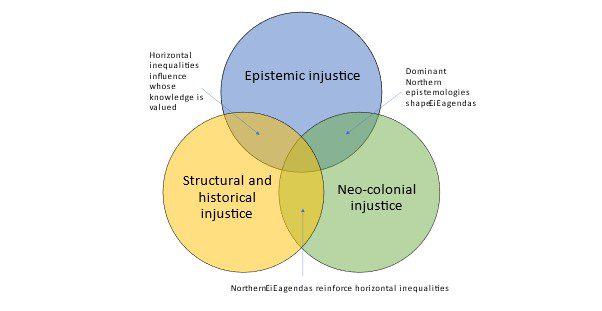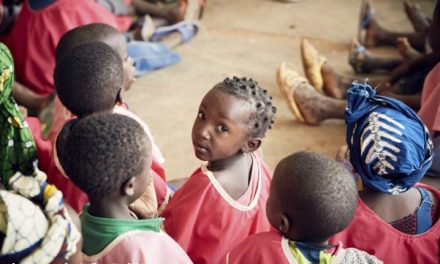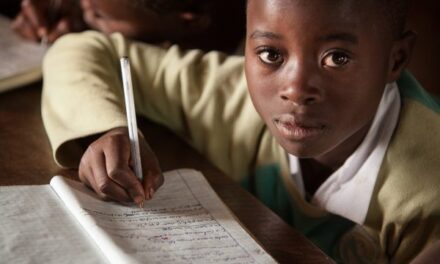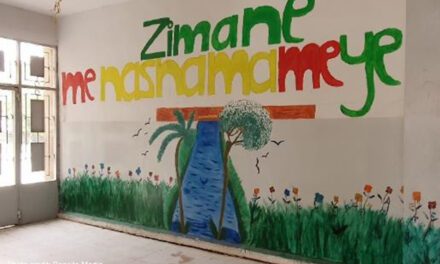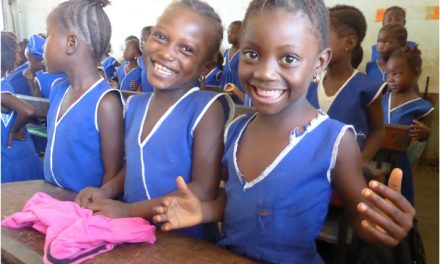This blog was written after the 2023 UKFIET conference by Geneviève Greer, who presented her ongoing PhD research as part of one of the conference sub-themes: Decolonisation, politics, knowledge and power. Geneviève has worked in education, humanitarian and international development for 15 years, designing, planning, monitoring and evaluating programmes. Geneviève’s current PhD research at Ulster University’s UNESCO Centre explores the influences and perspectives of education actors from the Global North and South in designing education programmes for conflict and crisis contexts.
After attending the 2023 UKFIET conference, my mind has been swirling about how my research might have relevance for the 800 or so attendees, and the thousands of international and humanitarian education practitioners around the world. Like most practitioners and academics, I have frequently been involved in designing programmes and writing proposals and funding applications. To be successful, you need to know the ‘rules of the game’ of the funder’s requirements. But to what extent do we reflect on our role in bending to funders requirements rather than co-designing or being led by the communities, learners and education systems we are designing programmes for? There is a significant gap between the rhetoric of localisation and reality: despite a push for localisation since the World Humanitarian Summit in 2016, most aid is still funded through Northern headquartered organisations, then implemented in the South, with local actor involvement in programme design often being tokenistic (Oddy, 2021). To what extent are we guilty of imposing Western ideals of education whilst erasing local and indigenous knowledge systems: a form of epistemic injustice?
The UKFIET conference raised issues of epistemic justice throughout: in Yulia Nesterova’s closing thoughts on the online day, before the in-person conference, she asked us to reflect on: whose knowledge matters, and to undertake self-reflection and critical conversations on power relations. Maria Balarin’s keynote focussed on Epistemic Injustice and that we need to: “relate as peers with equal moral worth” and acknowledge that “education is overloaded with poorly specified justice responses.” My ongoing PhD research looks at how and what we design as education programmes and what are we influenced by as practitioners? My research critically examines the role played by actors from the Global North and South in designing education programmes for conflict and crisis contexts in the Global South. Practitioner discussions and the literature highlight the technical and efficiency versus moral and equity tensions faced by humanitarian and development aid sectors (see Fig 1), yet the perspectives and political economy landscape of these actors who play an influential role in education systems remains under-researched.
Fig 1: Global concepts influencing Education Programme Designers.
UKFIET’s theme this year looked at social and environmental justice, and how: ‘re-imagining relations between global North and South in education and learning is fundamental to addressing marginalisation and its root causes, including by ‘reversing the gaze’ to critically examine the role played by the North in education, learning, and development’. I’m still in the middle of my research, which uses a combination of Q Methodology and qualitative interviews with 30 international education programme designers, but by reversing the gaze and looking at the practitioners behind the programmes, what has emerged so far, is that participants have found the process ‘thought-provoking’, ‘challenging’ and ‘made me consider my own views’, and that it has ‘helped practitioners ‘critically reflect on our role.’
Ritesh Shah’s powerful presentation Doing harm: Erasures in the Education in Emergencies ecosystem and the impact of funding cuts (Shah et al, 2023) really resonated with me, and the conversations I’ve been having with practitioners. How many of us have been involved in designing a programme with the involvement of governments, teachers and learners, only to find that the project’s funding will not be renewed, or will be cut short, or that the proposal is not successful? We often stay silent about the injustices we witness and are inadvertently part of, moving onto the next funding proposal. The damage to education systems and learners is significant: to previously out-of-school learners for whom it may have been their last chance at education; to refugee teachers and teachers who find they will no longer be paid a salary; to communities who risk seeing ethnic conflict re-ignite because of the closure of an inter-ethnic school; to the local researchers whose livelihoods are lost as their contracts are abruptly terminated. We must be reflective about the structural and historic injustices associated with the lack of conflict sensitivity and frequent and repeated false promises in programming.
Q Methodology – helping to make sense of shared meaning, common viewpoints and differences.
I’ve used Q Methodology – which is a mixed-methodology for studying perspectives and ‘complex issues of human ‘subjectivity’ to explore these issues. It ‘identifies differences in what people think, as well as common viewpoints (shared meaning)’ (Churruca et al, 2021).
I developed a framework of 45 statements which represent overall opinions on how the key drivers and influences over programme designers working in humanitarian, peacebuilding and international development ecosystem (Fig.2) intersect with global concepts (Fig.1). The statements represent a range of viewpoints in discourse today.
Fig 2: Eco-systemic model of education programme designers working in conflict and crisis (adapted from Bronfenbrenner, 1979).
My proposition is that education programme designers are in a constant push and pull between concepts of globalisation, neo-liberal, technical and efficiency, versus drivers of localisation, ethical and moral values, social justice and equity. Indeed, Maria Balarin’s UKFIET keynote talked about the ‘internal and external push and pull factors in the justice agenda’.
Although I’m still in the middle of my analysis, some key findings so far are that shared meaning and common viewpoints coalesced around seeing youth as solution makers, and the importance of conflict analysis. Differences of opinion are emerging around the role of EdTech and the private sector as solutions in conflict- and crisis-affected education, the role of climate-smart education systems and whether the Global North funding and implementing education programmes in the Global South represented neo-colonialism and White Saviourism.
The participant interviews have demonstrated critical self-reflections around epistemic injustice:
“(we are) assuming that the values or the practices that we are used to in Europe in the global North should be applied by default to everywhere, and this goes for activities, for approaches, for policies, for standards.”
“We are not valuing indigenous knowledge. We are seeing people as lacking capacity. We are always thinking we are more superior than others, so we can talk of all this sexy, global coined terminologies that may not mean much to the students and community we are working with.”
My research going forwards looks to explore and analyse these subjectivities and analyse the findings through an injustices lens, to potentially re-think how education programmes in contexts of conflict and crisis are designed. I’m employing ‘The Injustices Model’ (Fig.3) as a conceptual framework to analyse political, structural, epistemic and neo-colonial injustices and ‘persistent challenges that often constrain education programming’ (Shanks & Paulson, forthcoming).
Fig 3. The Injustices Model (Shanks & Paulson, forthcoming)
During the conference I was also inspired by Maria Balarin’s presentation and the concept of ‘hopeful pessimism’ (Van der Lugt, 2019), and Prachi Srivastava’s (2022, 2023) presentation around the concept of ‘Epistemic Humility’, whereby we show humility in recognising what doesn’t work, where we are aware of one’s biases and are willing to accept that we do not and cannot know everything and be open to education as not just a technocratic solution. Perhaps when we are next about to write a proposal or design a programme for a context that is not our own or is in a crisis for which we cannot yet know the solutions for, we go into the process with hopeful pessimism, epistemic humility and an awareness of the potential injustices within and through our programmes.
References:
Balarin, Maria (2023) UKFIET keynote plenary presentation. Group for the Analysis of Development, Peru.
Bronfenbrenner (1979) The Ecology of Human Development: Experiments by Nature and Design. Boston: Harvard University Press.
Churruca et al (2021) A scoping review of Q-methodology in healthcare research. BMC Med Res Methodology (2021) 21:125.
Oddy, Jessica (2021) Why Equity-Based Design Thinking is Key to Decolonising EIE. INEE blog.
Shah, Ritesh; D. Brent Edwards Jr.; S. Garnett Russell; Claudia Mitchell; Mauro C; Moschetti; Ha Yeon Kim; Carly Tubbs Dolan (2023) Who holds whom to account when harm is done? Funder accountability and responsibility with the education in emergencies community. July 25 2023, Humanitarian Practice Network.
Shah, Ritesh (2023) UKFIET: Doing harm: Erasures in the Education in Emergencies ecosystem. Faculty of Education and Social Work, University of Auckland.
Shanks & Paulson (2022, forthcoming) Shanks, Paulson, Akar, Balarin, Bozichaeva, Emelife, Rodriguez (2022) Bringing peacebuilding to nexus thinking in education in emergencies: Promising practices to overcome injustices. EiE Hub (forthcoming).
Srivastava, Prachi (2023) UKFIET: Symposium session Decolonising Education and Development: Curricula, Data and Purpose.
Srivastava, Prachi (2022) Education and the Pandemic: Engaging in Epistemic Humility to Question Assumptions, Institutions, and Knowledges. Education Publications; 311; UNESCO Working Papers; May 2022 ED-2022/WP-30/1.
Van der Lugt, Mara (2019) “Pessimism”: An Essay by Mara Van Der Lugt (Keywords: Suffering; Fatalism; Ethics; Schopenhauer). From The Philosopher, vol. 107, no. 4 (‘This Life’). Autumn 2019.

